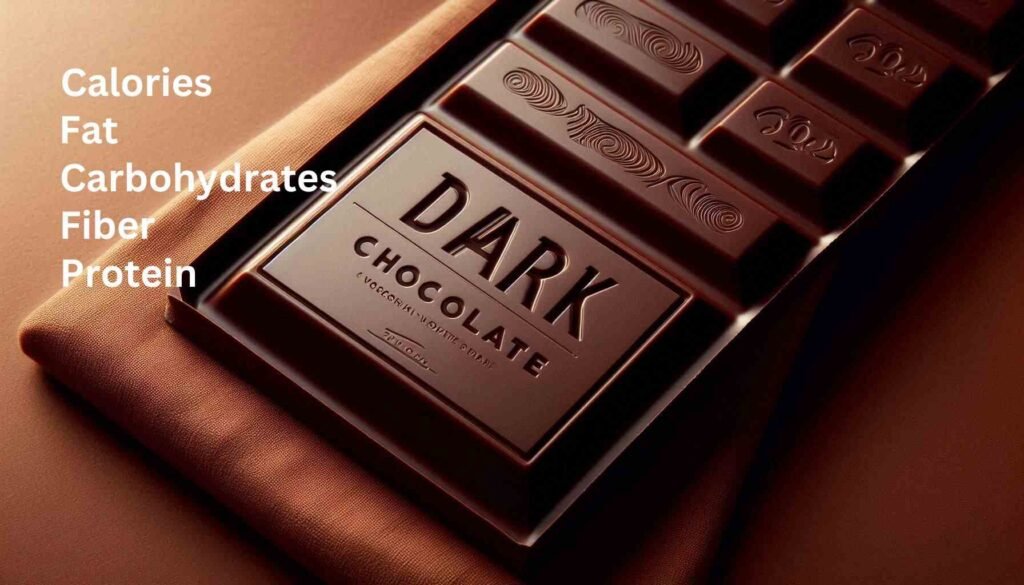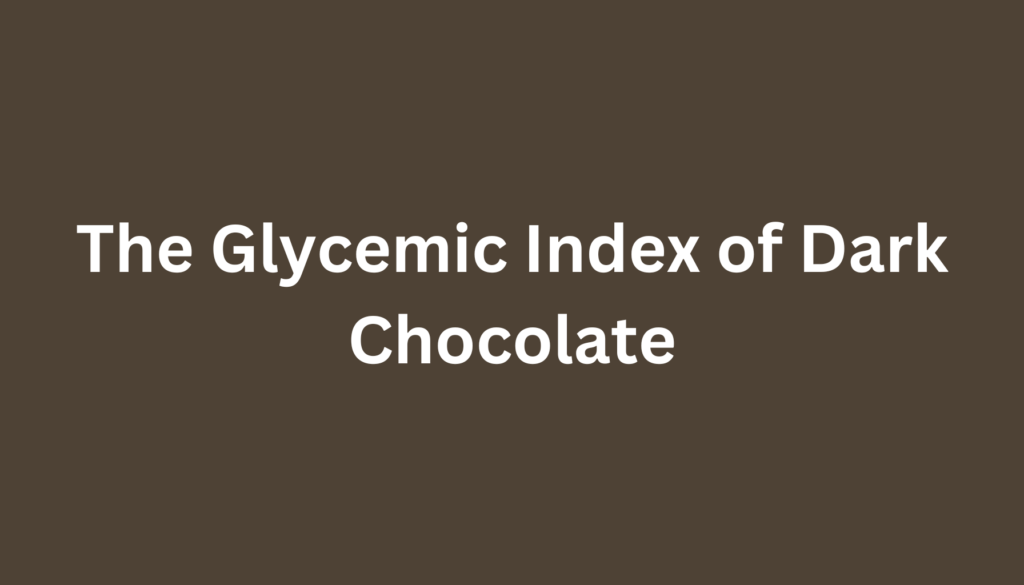Dark chocolate for diabetics might sound like a contradiction, but what if you could enjoy this indulgence without the guilt? For many, managing diabetes feels like giving up all the little joys in life, especially sweet treats.
But here’s the good news dark chocolate, when chosen carefully and eaten in moderation, could not only satisfy your cravings but also support your health.
Imagine savoring the rich, bittersweet taste of chocolate while knowing it might actually be good for your blood sugar levels. Intrigued? Let’s explore how this treat can fit into your life.
Understanding Dark Chocolate

Dark chocolate is different from the usual milk chocolate most people are familiar with. The key difference lies in its ingredients. Dark chocolate contains cocoa solids, cocoa butter, and only a small amount of sugar.
The higher the cocoa percentage, the less sugar it typically contains.
For example:
- A 70% dark chocolate bar has about 30% non-cocoa ingredients (like sugar).
- In contrast, milk chocolate often contains less than 40% cocoa and much more sugar and milk solids.
This composition makes dark chocolate richer in nutrients and less likely to spike blood sugar than its sweeter counterpart.
Nutritional Profile of Dark Chocolate

Dark chocolate offers more than just flavor. Here’s a breakdown of what you get in a typical serving of high-quality 70-85% dark chocolate (about 1 ounce or 28 grams):
- Calories: 170-190
- Fat: 12-15 grams (mostly healthy fats like oleic acid)
- Carbohydrates: 12-13 grams, including 3-4 grams of sugar
- Fiber: 3-4 grams
- Protein: 2-3 grams
Dark chocolate is a good source of:
- Magnesium: Helps regulate blood sugar levels.
- Iron: Supports energy levels.
- Antioxidants: Flavonoids that reduce oxidative stress.
How Cocoa Impacts Blood Sugar Levels

The primary ingredient in dark chocolate cocoa has unique effects on blood sugar. Research shows that cocoa flavonoids may enhance insulin sensitivity.
Insulin is the hormone that helps your cells absorb glucose from the bloodstream, so better sensitivity means your body can manage blood sugar more effectively.
A study published in The American Journal of Clinical Nutrition found that participants who consumed flavonoid-rich cocoa had improved glucose control.
This makes cocoa a promising food for diabetics. However, it’s not a free pass to overindulge in chocolate. The benefits are tied to moderation.
The Glycemic Index of Dark Chocolate

“The glycemic index (GI) measures how rapidly different foods elevate blood glucose levels. Foods with a low GI are broken down more gradually, resulting in a slower and more steady increase in blood sugar.
This is particularly important for diabetics who need to avoid sharp spikes.
- Dark chocolate (70% or higher): GI of about 23.
- Milk chocolate: GI of 42-60.
- Sugary candies: GI of 70 or more.
These numbers show that dark chocolate, with its lower sugar content, is a safer choice for blood sugar control.
Benefits of Dark Chocolate for Diabetics

Dark chocolate isn’t just a tasty treat—it comes with real benefits for people managing diabetes:
- Improved Insulin Sensitivity
The flavonoids in dark chocolate may improve how your body responds to insulin. This makes it easier to regulate blood sugar levels. - Reduced Inflammation
Chronic inflammation is a common issue in diabetics and can worsen complications. The antioxidants in dark chocolate help fight inflammation. - Better Heart Health
Diabetes increases the risk of heart disease. Dark chocolate can help by lowering LDL cholesterol (the “bad” kind) and increasing HDL cholesterol (the “good” kind). - Enhanced Mood
Managing diabetes can be stressful. Dark chocolate contains compounds like theobromine that may improve mood and reduce stress, indirectly benefiting blood sugar control.
credit:SugarMD
Risks of Consuming Dark Chocolate for Diabetics

While dark chocolate offers health benefits, there are risks to keep in mind:
- Hidden Sugars
Some brands add more sugar than you’d expect, even in “dark” chocolate. Check the ingredient in the lable. - Portion Control
Dark chocolate is calorie-dense. Eating more than the recommended serving can lead to weight gain, which may worsen insulin resistance. - Caffeine Content
Dark chocolate contains caffeine, which could interfere with sleep if consumed in large amounts. Insufficient sleep can lead to poorer blood sugar management.
Exploring How Cocoa Flavonoids Can Aid in Diabetes Management
Flavonoids are plant-based antioxidants that offer a wide range of health benefits:
- Lower Blood Pressure: Helps reduce strain on the heart.
- Improved Blood Flow: Better circulation supports overall health, especially in diabetics who may experience poor blood flow.
- Blood Sugar Regulation: Flavonoids have been shown to enhance insulin activity and reduce glucose spikes after meals.
Choosing the Right Dark Chocolate
Not all dark chocolate is created equal. To get the most benefits, keep these tips in mind:
- Go for High Cocoa Percentage
Look for chocolate with 70% cocoa or higher. The higher percentage of cocoa contains less sugar. - Avoid Additives
Skip brands with added flavors, preservatives, or excessive sweeteners. - Read the Label
Check for minimal ingredients: cocoa mass, cocoa butter, and a small amount of sugar.
Portion Sizes and Moderation
Even the healthiest foods can be harmful if overconsumed. A safe portion size for dark chocolate is about 1 ounce (28 grams) per day, which is roughly 2-3 small squares.
To make the most of your serving:
- Eat it as a snack between meals to avoid sugar spikes.
- Pair it with nuts or seeds to slow digestion and keep you full longer.
How to Incorporate Dark Chocolate into a Diabetic Diet
Dark chocolate can be a delicious part of your meal plan.
- As a Snack: Combine a piece of dark chocolate with a handful of almonds or walnuts for a low-GI, nutrient-packed snack.
- In Baking: Use dark chocolate chips in low-sugar muffin or cookie recipes.
- Hot Cocoa: Make a warming drink with unsweetened cocoa powder, almond milk, and a sugar alternative like stevia.
- Fruit Pairing: Dip strawberries, apple slices, or bananas in melted dark chocolate for a treat with natural sweetness.
Comparing Dark Chocolate to Other Sweet Treats
If you’re craving something sweet, dark chocolate is often the better option compared to:
- Milk Chocolate: Higher in sugar and lower in nutrients.
- Sugar-Free Candies: May contain artificial sweeteners that upset digestion.
Dark chocolate satisfies your sweet tooth while offering health benefits a win-win!
Myths and Misconceptions About Dark Chocolate and Diabetes
Let’s address some common myths:
- “Dark chocolate cures diabetes.”
False. While it has health benefits, it’s not a cure. - “Sugar-free chocolate is always better.”
Not necessarily. Some sugar-free options are full of artificial ingredients or hidden carbs. - “You can’t eat as much as you want.”
Moderation is still key, even for the healthiest options.
Dark Chocolate and Cardiovascular Health in Diabetics
Cardiovascular health is a top concern for diabetics. Dark chocolate may support heart health by:
- Reducing plaque buildup in arteries.
- Lowering blood pressure.
- Improving cholesterol levels.
These benefits make it a heart-friendly indulgence when consumed in moderation.
Practical Tips for Diabetics Enjoying Dark Chocolate
Here’s how to make dark chocolate work for you:
- Choose high-quality brands with minimal sugar.
- Avoid eating chocolate on an empty stomach, it can cause a quicker blood sugar rise.
- Pair it with protein or healthy fats to balance the impact on blood sugar.
Consult Your Healthcare Provider
Before adding dark chocolate to your regular diet, talk to your doctor or dietitian. They can help determine how it fits into your meal plan based on your individual health needs.
Conclusion
Dark chocolate, when chosen wisely and eaten in moderation, can be a delightful addition to a diabetic-friendly diet. Its low glycemic index, antioxidant content, and heart-health benefits make it a better choice than many other treats. Remember, balance is key, enjoy your chocolate mindfully to keep your blood sugar and health goals on track.
Frequently Asked Questions (FAQs)
Is dark chocolate safe for diabetics?
Yes, dark chocolate is generally safe for diabetics when consumed in moderation. It has a low glycemic index and is rich in antioxidants, which can help improve insulin sensitivity. However, always choose dark chocolate with at least 70% cocoa content and minimal added sugar.
How much dark chocolate can a diabetic eat daily?
A safe portion for most diabetics is about 1 ounce (28 grams) per day, which is equivalent to 2-3 small squares. It’s important to monitor blood sugar levels to ensure it fits well into your overall diet.
Does dark chocolate spike blood sugar levels?
Dark chocolate with 70% or more cocoa typically has a low glycemic index, meaning it causes a slower and more gradual increase in blood sugar compared to milk chocolate or sugary treats. However, the impact may vary depending on individual glucose tolerance.
What is the best time for diabetics to eat dark chocolate?
The best time to enjoy dark chocolate is with a meal or as part of a balanced snack, such as pairing it with nuts or yogurt. This helps slow sugar absorption and prevents sudden spikes in blood sugar.
Can sugar-free dark chocolate be a better option for diabetics?
Sugar-free dark chocolate can be a good option, but it’s essential to check the label. Some sugar-free products may contain artificial sweeteners or sugar alcohols, which can still affect blood sugar levels or cause digestive issues.
Is 85% dark chocolate better than 70% for diabetics?
Yes, 85% dark chocolate is often better for diabetics as it contains less sugar and more cocoa solids. However, it may taste more bitter, so personal preference plays a role.
Can eating too much dark chocolate cause weight gain?
Yes, even dark chocolate is calorie-dense, and overeating it can lead to weight gain. Maintaining a healthy weight is crucial for diabetes management, so portion control is key.
Are there any side effects of dark chocolate for diabetics?
Potential side effects include weight gain from overconsumption, hidden sugars in some brands, and possible digestive discomfort if consuming sugar-free varieties with sugar alcohols. Always read the ingredient label carefully.
Does dark chocolate help with diabetes-related complications?
Dark chocolate may help reduce risks associated with diabetes, such as cardiovascular issues. Its antioxidants can improve blood vessel function, reduce bad cholesterol, and support overall heart health. However, it’s not a substitute for proper medical care or medication.
Should I consult my doctor before eating dark chocolate regularly?
Yes, always consult your doctor or dietitian before making any dietary changes. They can help determine how dark chocolate fits into your overall diabetes management plan based on your individual needs.




